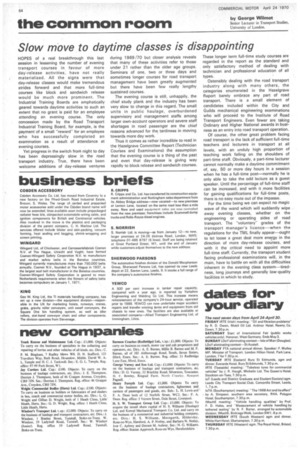Slow move to daytime classes is disappointing
Page 66

If you've noticed an error in this article please click here to report it so we can fix it.
HOPES of a real breakthrough this last session in lessening the number of evening transport courses in favour of more day-release activities, have not really materialized. All the signs were that day-release classes would make tremendous strides forward and that more full-time courses like block and sandwich release would be much more prominent. The Industrial Training Boards are emphatically geared towards daytime activities to such an extent that no grant is paid for an employee attending an evening course. The only concession made by the Road Transport Industrial Training Board, for example, is the payment of a small "reward" for an employee who has successfully completed an examination as a result of attendance at evening courses.
Yet progress in the switch from night to day has been depressingly slow in the road transport industry. True, there have been welcome additions of day-release ventures during 1969/70 but closer analysis reveals that many of these activities refer to those under 21 rather than the older age groups. Seminars of one, two or three days and sometimes longer courses for road transport management have been greatly augmented but there have been few really lengthy sustained courses.
The evening course is still, unhappily, the chief study plank and the industry has been very slow to change in this regard. The small units in public haulage, overburdened supervisory and management staffs among larger own-account operators and severe staff shortages in road passenger are the chief reasons advanced for the tardiness in moving towards more day work.
Thus it comes as rather incredible to read in the Hazelgrave Committee Report (Technician Courses and Examinations) the assumption that the evening course is a thing of the past and even that day-release is giving way rapidly to block release and sandwich courses. These longer term full-time study courses are regarded in the report as the standard and only satisfactory method of dealing with technician and professional education of all types.
Ostensibly dealing with the road transport industry along with many others, the categories enumerated in the Hazelgrave Report barely embrace any part of road transport. There is a small element of candidates included within the City and Guilds mechanical engineering examinations who will proceed to the Institute of Road Transport Engineers. Even fewer are taking Ordinary and Higher National awards in business as an entry into road transport operation.
Of course, the other great problem facing road transport is the lack of sufficient full-time teachers and lecturers in transport at all levels, with an unduly high proportion of teaching work falling on the shoulders of part-time staff. Obviously, a part-time lecturer cannot normally make a daytime commitment of, say, 50 or more day hours in a session when he has a full-time post—normally he is only able to take the odd lecture as a guest speaker. Until the percentage of full-time staff can be increased, and with it more facilities for gaining qualifications for full-time posts, there is no easy route out of the impasse.
For the time being we can expect no magic wave of the wand which will suddently wipe away evening classes, whether on the engineering or operating sides of road transport. The "voluntary" grades of the transport manager's licence--when the regulations for the TML finally appear---ought to let loose a great deal more energy in the direction of more day-release courses, and with it the critical need to appoint more full-time staff. Currently, the transport student facing professional examinations will, in the main, have to battle on with all the difficulties inherent in the evening class system—tiredness, long journeys and generally low-quality facilities in which to study.














































































































